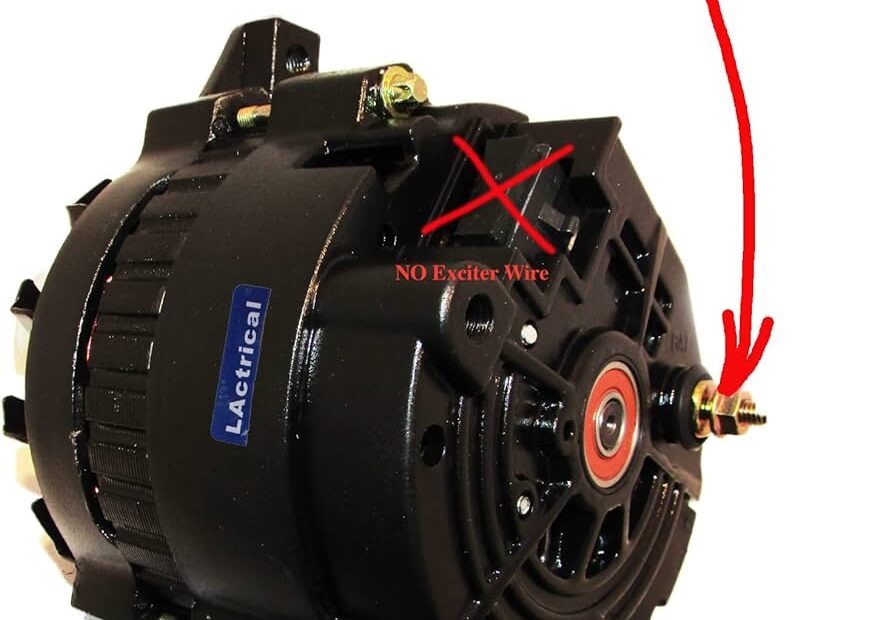To wire the exciter wire on an alternator, first identify the terminal labeled “exc” or “exciter” on the alternator, then connect the exciter wire to this terminal. This wire is responsible for supplying voltage to the alternator’s rotor, which in turn generates the magnetic field necessary for the alternator to produce electrical power.
By connecting the exciter wire correctly, you ensure that the alternator is properly energized and ready to generate power when the engine is running. This simple step is essential for proper alternator operation and charging of the vehicle’s battery.

Credit: m.youtube.com
Understanding The Exciter Wire
The exciter wire plays a crucial role in the alternator system. It serves as an energizing source for the alternator’s rotor, allowing it to produce electricity. Without proper wiring of the exciter wire, the alternator may fail to generate sufficient power or even fail altogether.
It is essential to understand the importance of correctly connecting the exciter wire to ensure the proper functioning of the alternator. Incorrect wiring could lead to fluctuations in electrical output, which can cause damage to other components in the system.
Therefore, it is crucial to follow the manufacturer’s guidelines and ensure the exciter wire is connected securely and correctly. By doing so, you can ensure the efficient and reliable operation of your alternator for optimal electrical performance. So, always pay attention to the exciter wire when wiring your alternator.
Tools And Materials Needed
To wire the exciter wire on an alternator, you’ll need a few essential tools and materials. Firstly, make sure you have a wire cutter and stripper to handle the wiring process. Additionally, a crimping tool is essential for secure connections.
You’ll also need electrical tape to insulate the wires and prevent any potential short circuits. When it comes to finding the right wire, look for a suitable gauge that can handle the alternator’s output. Other necessary materials include electrical connectors, such as butt connectors or ring terminals, to attach the wire securely.
Make sure to choose connectors that are compatible with the wire size and easy to crimp. With these tools and materials at hand, you can confidently wire the exciter wire on your alternator, ensuring optimal performance.
Step-By-Step Wiring Process
To wire the exciter wire on an alternator, follow these step-by-step instructions. First, ensure safety by taking necessary precautions. Identify the location of the exciter wire. Then, prepare the wire and connector for wiring.
Wiring The Exciter Wire
Wiring the exciter wire on an alternator can be done in a few simple steps. First, locate the exciter wire on the alternator. Connect this wire to the appropriate terminal on the alternator, ensuring a secure connection. To secure the connection, use a wire connector or crimping tool.
Once the wire is connected, it is important to insulate and protect it. This can be done by wrapping the wire with electrical tape or using heat shrink tubing. Insulating the wire will prevent any potential short circuits or damage.
By following these steps, you can successfully wire the exciter wire on your alternator and ensure proper functioning of your electrical system.
Testing The Connection
Firstly, it’s essential to test the connection of the exciter wire on the alternator. Using a multimeter, you can verify the wiring and ensure it is functioning properly. Troubleshooting common issues may arise during this process and need to be addressed accordingly.
The key is to carefully examine the connection and look for any signs of damage or loose connections. By doing so, you can ensure the overall performance and efficiency of the alternator. Regular testing and maintenance are crucial to avoid potential problems and extend the lifespan of the alternator.
Remember to take the necessary precautions while handling electrical components and consult a professional if needed.
Tips And Best Practices
To ensure a reliable connection, follow these tips and best practices when wiring the exciter wire on your alternator. First, avoid common mistakes like using worn out or damaged wires. It’s important to have a solid connection for optimal performance.
Next, make sure that the wire is properly secured and insulated to prevent any short circuits or electrical mishaps. Regularly check the wire for any signs of wear and tear, and replace it if necessary. Additionally, remember to connect the exciter wire to the correct terminal on the alternator, as an incorrect connection can lead to electrical issues.
By following these guidelines, you can maintain the exciter wire on your alternator and ensure its proper functioning.
Additional Considerations
When it comes to wiring the exciter wire on an alternator, there are some additional considerations to keep in mind. One important factor is the compatibility of the alternator. Ensure that the alternator is compatible with your vehicle’s make and model to avoid any compatibility issues.
Additionally, if you are upgrading the exciter wire, it’s essential to follow the proper guidelines and instructions provided by the manufacturer. Remember to seek professional assistance if needed. Expert knowledge can save you time and prevent any possible damage or electrical issues.
With the right information and guidance, wiring the exciter wire on your alternator can be a smooth and successful process.
Frequently Asked Questions On How To Wire Exciter Wire On Alternator
Where Do You Connect The Exciter Wire On An Alternator?
The exciter wire on an alternator is connected to the battery to generate electrical power.
Does A One Wire Alternator Need An Exciter Wire?
A one wire alternator does not require an exciter wire for its operation.
Where Does Exciter Wire Get Power?
The exciter wire gets power from the vehicle’s battery or electrical system.
How Does Exciter Work On Alternator?
The exciter on an alternator generates an electric current to power the rotor, creating a magnetic field.
Conclusion
To sum up, wiring the exciter wire on an alternator is a crucial step in ensuring the proper functioning of the electrical system in your vehicle. By following the steps mentioned in this blog post, you can confidently complete this task.
Remember to start by disconnecting the battery to avoid any mishaps. Then, identify the exciter wire and connect it to the appropriate terminal on the alternator. Double-check your connections and ensure they are secure. Once you have completed the wiring process, reattach the battery and test the alternator to ensure it is working as expected.
By understanding the importance of the exciter wire and following the correct procedures, you can effectively wire the exciter wire on your alternator and keep your vehicle’s electrical system running smoothly.

